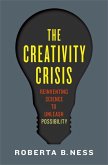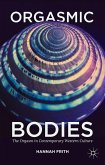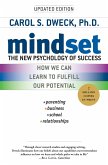Robert W Proctor, E J Capaldi
Psychology of Science
Implicit and Explicit Processes: 2nd Purdue Symposium on Psychological Sciences
Robert W Proctor, E J Capaldi
Psychology of Science
Implicit and Explicit Processes: 2nd Purdue Symposium on Psychological Sciences
- Gebundenes Buch
- Merkliste
- Auf die Merkliste
- Bewerten Bewerten
- Teilen
- Produkt teilen
- Produkterinnerung
- Produkterinnerung
Psychology of Science brings together contributions from leaders in the emerging discipline of the psychology of science with other experts on the roles of implicit and explicit processes in thinking. Highlighting the role of implicit processes in the creation of scientific knowledge, this volume links the psychology of science to many strands of psychology, including cognitive, social, and developmental psychology, as well as neuroscience. Ultimately, this volume raises awareness of the psychology of science among psychologists, philosophers, and sociologists of science, and anyone interested in the metasciences.…mehr
Andere Kunden interessierten sich auch für
![Survival of the Nicest Survival of the Nicest]() Stefan KleinSurvival of the Nicest21,99 €
Stefan KleinSurvival of the Nicest21,99 €![Creativity Crisis Creativity Crisis]() Roberta NessCreativity Crisis44,99 €
Roberta NessCreativity Crisis44,99 €![Social Science Methods for Psychodynamic Inquiry Social Science Methods for Psychodynamic Inquiry]() William R MeyersSocial Science Methods for Psychodynamic Inquiry74,99 €
William R MeyersSocial Science Methods for Psychodynamic Inquiry74,99 €![Orgasmic Bodies Orgasmic Bodies]() Hannah FrithOrgasmic Bodies37,99 €
Hannah FrithOrgasmic Bodies37,99 €![Mysteries and Secrets Revealed Mysteries and Secrets Revealed]() Loren PankratzMysteries and Secrets Revealed27,99 €
Loren PankratzMysteries and Secrets Revealed27,99 €![Orgasmic Bodies Orgasmic Bodies]() Hannah FrithOrgasmic Bodies37,99 €
Hannah FrithOrgasmic Bodies37,99 €![Mindset Mindset]() Carol DweckMindset12,99 €
Carol DweckMindset12,99 €-
-
-
Psychology of Science brings together contributions from leaders in the emerging discipline of the psychology of science with other experts on the roles of implicit and explicit processes in thinking. Highlighting the role of implicit processes in the creation of scientific knowledge, this volume links the psychology of science to many strands of psychology, including cognitive, social, and developmental psychology, as well as neuroscience. Ultimately, this volume raises awareness of the psychology of science among psychologists, philosophers, and sociologists of science, and anyone interested in the metasciences.
Hinweis: Dieser Artikel kann nur an eine deutsche Lieferadresse ausgeliefert werden.
Hinweis: Dieser Artikel kann nur an eine deutsche Lieferadresse ausgeliefert werden.
Produktdetails
- Produktdetails
- Verlag: Oxford University Press
- Seitenzahl: 552
- Erscheinungstermin: 2. Juli 2012
- Englisch
- Abmessung: 236mm x 155mm x 41mm
- Gewicht: 885g
- ISBN-13: 9780199753628
- ISBN-10: 0199753628
- Artikelnr.: 37257885
- Herstellerkennzeichnung
- Produktsicherheitsverantwortliche/r
- Europaallee 1
- 36244 Bad Hersfeld
- gpsr@libri.de
- Verlag: Oxford University Press
- Seitenzahl: 552
- Erscheinungstermin: 2. Juli 2012
- Englisch
- Abmessung: 236mm x 155mm x 41mm
- Gewicht: 885g
- ISBN-13: 9780199753628
- ISBN-10: 0199753628
- Artikelnr.: 37257885
- Herstellerkennzeichnung
- Produktsicherheitsverantwortliche/r
- Europaallee 1
- 36244 Bad Hersfeld
- gpsr@libri.de
Robert W. Proctor is Distinguished Professor of Psychological Sciences at Purdue University. He has been teaching and conducting research in the areas of attention and performance for 35 years. He is editor of the American Journal of Psychology, the first psychology journal in the U.S. He is also a fellow of the American Psychological Association and the Association for Psychological Science. E.J. Capaldi is Emeritus Professor of Psychological Sciences at Purdue University. He is a leading researcher in the field of learning and memory, and has authored numerous articles and contributed to many books in those areas. Drs. Proctor and Capaldi have been working together in the areas of philosophy and psychology of science since the early 1990s. They have co-authored 12 articles and chapters in these areas, as well as two books, Why Science Matters: Understanding the Methods of Psychological Research and Contextualism in Psychological Research?: A Critical Review.
* Introduction
* Implicit and Explicit Processes in the Psychology of Science
* Robert W. Proctor and E. J. Capaldi
* Part 1: Role of the Psychology of Science and its Methods
* Chapter 1
* The Psychology of Science is Off and Running but Where Do We Go from
Here?
* Gregory Feist
* Chapter 2
* Psychology of Science: Influence on the Philosophy of Science
* E. J. Capaldi and Robert W. Proctor
* Chapter 3
* Methodological Approaches to Scientific and Technological Thinking
* Michael E. Gorman
* Part 2: Agency and Reasoning in the Psychology of Science
* Chapter 4
* The Role of Psychology in an Agent-Based Theory of Science
* Ronald N. Giere
* Chapter 5
* The Acting Person in Scientific Practice
* Lisa Osbeck and Nancy J. Nersessian
* Chapter 6
* Inference to the Best Explanation (IBE) and the Causal and Scientific
Reasoning of Non-scientists
* Barbara Koslowski
* Chapter 7
* Classifying and Remediating Late Elementary and Middle School
Students' Errors and Misconceptions about Experimental Design
* Stephanie A. Siler and David Klahr
* Part 3: Implicit and Explicit Processes in the Cognitive Psychology
of Science
* Chapter 8
* What are Implicit and Explicit Processes?
* Jan De Houwer and Agnes Moors
* Chapter 9
* How Should We Understand the Implicit and Explicit Processes in
Scientific Thinking?
* Donelson E. Dulany
* Chapter 10
* The Interaction of Implicit vs. Explicit Processing and Problem
Difficulty in a Scientific Discovery Task
* Corinne Zimmerman and Jean E. Pretz
* Part 4: Psychological Perspectives: Influence on Science
* Chapter 11
* Implicit Cognition and Researcher Conflict of Interest
* Anthony G. Greenwald
* Chapter 12
* Science, Feminism, and the Psychology of Investigating Gender
* Alice H. Eagly
* Chapter 13
* The Theory Ladenness of the Mental Processes used in the Scientific
Enterprise: Evidence from Cognitive Psychology and the History of
Science
* William F. Brewer
* Chapter 14
* The Practice of Psychological Science in Social-Personality Research:
Are We Still a Science of Two Disciplines?
* Jessica L. Tracy, Richard W. Robins, and Jeffrey W. Sherman
* Part 5: Scientific Creativity
* Chapter 15
* Scientific Creativity as Blind Variation: Explicit and Implicit
Procedures, Mechanisms, and Processes
* Dean Keith Simonton
* Chapter 16
* Creative Combination of Representations: Scientific Discovery and
Technological Invention
* Paul Thagard
* Chapter 17
* On the Unreasonable Reasonableness of Mathematical Physics: A
Cognitive View
* Ryan Tweney
* Chapter 18
* Digging into Implicit/Explicit States and Processes: The Case of
Cognitive/Social Process Interaction in Scientific Groups
* Susannah B. F. Paletz and Christian D. Schunn
* Part 6: Unconventional Perspectives on the Conduct of Science
* Chapter 19
* Implicit Ontological Reasoning: The Problems of Dualism in
Psychological Science
* Brent D. Slife, Jeffrey S. Reber, and James E. Faulconer
* Chapter 20
* Notre Trahison Des Clercs: Implicit Aspirations - Explicit
Exploitations
* Peter A. Hancock
* Implicit and Explicit Processes in the Psychology of Science
* Robert W. Proctor and E. J. Capaldi
* Part 1: Role of the Psychology of Science and its Methods
* Chapter 1
* The Psychology of Science is Off and Running but Where Do We Go from
Here?
* Gregory Feist
* Chapter 2
* Psychology of Science: Influence on the Philosophy of Science
* E. J. Capaldi and Robert W. Proctor
* Chapter 3
* Methodological Approaches to Scientific and Technological Thinking
* Michael E. Gorman
* Part 2: Agency and Reasoning in the Psychology of Science
* Chapter 4
* The Role of Psychology in an Agent-Based Theory of Science
* Ronald N. Giere
* Chapter 5
* The Acting Person in Scientific Practice
* Lisa Osbeck and Nancy J. Nersessian
* Chapter 6
* Inference to the Best Explanation (IBE) and the Causal and Scientific
Reasoning of Non-scientists
* Barbara Koslowski
* Chapter 7
* Classifying and Remediating Late Elementary and Middle School
Students' Errors and Misconceptions about Experimental Design
* Stephanie A. Siler and David Klahr
* Part 3: Implicit and Explicit Processes in the Cognitive Psychology
of Science
* Chapter 8
* What are Implicit and Explicit Processes?
* Jan De Houwer and Agnes Moors
* Chapter 9
* How Should We Understand the Implicit and Explicit Processes in
Scientific Thinking?
* Donelson E. Dulany
* Chapter 10
* The Interaction of Implicit vs. Explicit Processing and Problem
Difficulty in a Scientific Discovery Task
* Corinne Zimmerman and Jean E. Pretz
* Part 4: Psychological Perspectives: Influence on Science
* Chapter 11
* Implicit Cognition and Researcher Conflict of Interest
* Anthony G. Greenwald
* Chapter 12
* Science, Feminism, and the Psychology of Investigating Gender
* Alice H. Eagly
* Chapter 13
* The Theory Ladenness of the Mental Processes used in the Scientific
Enterprise: Evidence from Cognitive Psychology and the History of
Science
* William F. Brewer
* Chapter 14
* The Practice of Psychological Science in Social-Personality Research:
Are We Still a Science of Two Disciplines?
* Jessica L. Tracy, Richard W. Robins, and Jeffrey W. Sherman
* Part 5: Scientific Creativity
* Chapter 15
* Scientific Creativity as Blind Variation: Explicit and Implicit
Procedures, Mechanisms, and Processes
* Dean Keith Simonton
* Chapter 16
* Creative Combination of Representations: Scientific Discovery and
Technological Invention
* Paul Thagard
* Chapter 17
* On the Unreasonable Reasonableness of Mathematical Physics: A
Cognitive View
* Ryan Tweney
* Chapter 18
* Digging into Implicit/Explicit States and Processes: The Case of
Cognitive/Social Process Interaction in Scientific Groups
* Susannah B. F. Paletz and Christian D. Schunn
* Part 6: Unconventional Perspectives on the Conduct of Science
* Chapter 19
* Implicit Ontological Reasoning: The Problems of Dualism in
Psychological Science
* Brent D. Slife, Jeffrey S. Reber, and James E. Faulconer
* Chapter 20
* Notre Trahison Des Clercs: Implicit Aspirations - Explicit
Exploitations
* Peter A. Hancock
* Introduction
* Implicit and Explicit Processes in the Psychology of Science
* Robert W. Proctor and E. J. Capaldi
* Part 1: Role of the Psychology of Science and its Methods
* Chapter 1
* The Psychology of Science is Off and Running but Where Do We Go from
Here?
* Gregory Feist
* Chapter 2
* Psychology of Science: Influence on the Philosophy of Science
* E. J. Capaldi and Robert W. Proctor
* Chapter 3
* Methodological Approaches to Scientific and Technological Thinking
* Michael E. Gorman
* Part 2: Agency and Reasoning in the Psychology of Science
* Chapter 4
* The Role of Psychology in an Agent-Based Theory of Science
* Ronald N. Giere
* Chapter 5
* The Acting Person in Scientific Practice
* Lisa Osbeck and Nancy J. Nersessian
* Chapter 6
* Inference to the Best Explanation (IBE) and the Causal and Scientific
Reasoning of Non-scientists
* Barbara Koslowski
* Chapter 7
* Classifying and Remediating Late Elementary and Middle School
Students' Errors and Misconceptions about Experimental Design
* Stephanie A. Siler and David Klahr
* Part 3: Implicit and Explicit Processes in the Cognitive Psychology
of Science
* Chapter 8
* What are Implicit and Explicit Processes?
* Jan De Houwer and Agnes Moors
* Chapter 9
* How Should We Understand the Implicit and Explicit Processes in
Scientific Thinking?
* Donelson E. Dulany
* Chapter 10
* The Interaction of Implicit vs. Explicit Processing and Problem
Difficulty in a Scientific Discovery Task
* Corinne Zimmerman and Jean E. Pretz
* Part 4: Psychological Perspectives: Influence on Science
* Chapter 11
* Implicit Cognition and Researcher Conflict of Interest
* Anthony G. Greenwald
* Chapter 12
* Science, Feminism, and the Psychology of Investigating Gender
* Alice H. Eagly
* Chapter 13
* The Theory Ladenness of the Mental Processes used in the Scientific
Enterprise: Evidence from Cognitive Psychology and the History of
Science
* William F. Brewer
* Chapter 14
* The Practice of Psychological Science in Social-Personality Research:
Are We Still a Science of Two Disciplines?
* Jessica L. Tracy, Richard W. Robins, and Jeffrey W. Sherman
* Part 5: Scientific Creativity
* Chapter 15
* Scientific Creativity as Blind Variation: Explicit and Implicit
Procedures, Mechanisms, and Processes
* Dean Keith Simonton
* Chapter 16
* Creative Combination of Representations: Scientific Discovery and
Technological Invention
* Paul Thagard
* Chapter 17
* On the Unreasonable Reasonableness of Mathematical Physics: A
Cognitive View
* Ryan Tweney
* Chapter 18
* Digging into Implicit/Explicit States and Processes: The Case of
Cognitive/Social Process Interaction in Scientific Groups
* Susannah B. F. Paletz and Christian D. Schunn
* Part 6: Unconventional Perspectives on the Conduct of Science
* Chapter 19
* Implicit Ontological Reasoning: The Problems of Dualism in
Psychological Science
* Brent D. Slife, Jeffrey S. Reber, and James E. Faulconer
* Chapter 20
* Notre Trahison Des Clercs: Implicit Aspirations - Explicit
Exploitations
* Peter A. Hancock
* Implicit and Explicit Processes in the Psychology of Science
* Robert W. Proctor and E. J. Capaldi
* Part 1: Role of the Psychology of Science and its Methods
* Chapter 1
* The Psychology of Science is Off and Running but Where Do We Go from
Here?
* Gregory Feist
* Chapter 2
* Psychology of Science: Influence on the Philosophy of Science
* E. J. Capaldi and Robert W. Proctor
* Chapter 3
* Methodological Approaches to Scientific and Technological Thinking
* Michael E. Gorman
* Part 2: Agency and Reasoning in the Psychology of Science
* Chapter 4
* The Role of Psychology in an Agent-Based Theory of Science
* Ronald N. Giere
* Chapter 5
* The Acting Person in Scientific Practice
* Lisa Osbeck and Nancy J. Nersessian
* Chapter 6
* Inference to the Best Explanation (IBE) and the Causal and Scientific
Reasoning of Non-scientists
* Barbara Koslowski
* Chapter 7
* Classifying and Remediating Late Elementary and Middle School
Students' Errors and Misconceptions about Experimental Design
* Stephanie A. Siler and David Klahr
* Part 3: Implicit and Explicit Processes in the Cognitive Psychology
of Science
* Chapter 8
* What are Implicit and Explicit Processes?
* Jan De Houwer and Agnes Moors
* Chapter 9
* How Should We Understand the Implicit and Explicit Processes in
Scientific Thinking?
* Donelson E. Dulany
* Chapter 10
* The Interaction of Implicit vs. Explicit Processing and Problem
Difficulty in a Scientific Discovery Task
* Corinne Zimmerman and Jean E. Pretz
* Part 4: Psychological Perspectives: Influence on Science
* Chapter 11
* Implicit Cognition and Researcher Conflict of Interest
* Anthony G. Greenwald
* Chapter 12
* Science, Feminism, and the Psychology of Investigating Gender
* Alice H. Eagly
* Chapter 13
* The Theory Ladenness of the Mental Processes used in the Scientific
Enterprise: Evidence from Cognitive Psychology and the History of
Science
* William F. Brewer
* Chapter 14
* The Practice of Psychological Science in Social-Personality Research:
Are We Still a Science of Two Disciplines?
* Jessica L. Tracy, Richard W. Robins, and Jeffrey W. Sherman
* Part 5: Scientific Creativity
* Chapter 15
* Scientific Creativity as Blind Variation: Explicit and Implicit
Procedures, Mechanisms, and Processes
* Dean Keith Simonton
* Chapter 16
* Creative Combination of Representations: Scientific Discovery and
Technological Invention
* Paul Thagard
* Chapter 17
* On the Unreasonable Reasonableness of Mathematical Physics: A
Cognitive View
* Ryan Tweney
* Chapter 18
* Digging into Implicit/Explicit States and Processes: The Case of
Cognitive/Social Process Interaction in Scientific Groups
* Susannah B. F. Paletz and Christian D. Schunn
* Part 6: Unconventional Perspectives on the Conduct of Science
* Chapter 19
* Implicit Ontological Reasoning: The Problems of Dualism in
Psychological Science
* Brent D. Slife, Jeffrey S. Reber, and James E. Faulconer
* Chapter 20
* Notre Trahison Des Clercs: Implicit Aspirations - Explicit
Exploitations
* Peter A. Hancock








